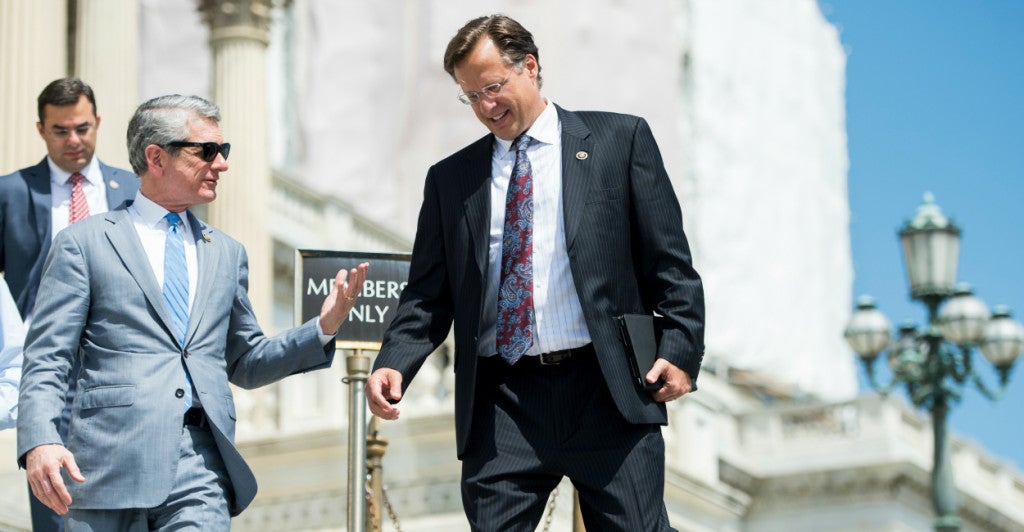Conservatives are not known for patience. A do-it-now, uncompromising mentality has helped the Tea Party topple former House Majority Leader Eric Cantor, and now Speaker John Boehner.
But just as they seem at the peak of their powers, conservatives are taking a step back, and taking a cautious, slow approach to upcoming leadership elections that will define the future of the House.
Conservatives of the House Freedom Caucus—whose 40 or so members helped expedite Boehner’s retirement—have decided for now not to push for one of their own to seek a leadership role in the House, including speaker.
Rather, these members plan to play a proactive role in the vetting of candidates, interviewing each of them and seeking promises before, hopefully, using their muster to unite as a caucus behind one candidate for each spot.
“In some ways, there’s merit to not having a member run,” said Cynthia Lummis, R-Wyo., speaking of the House Freedom Caucus, to which she belongs.
“There is tremendous animosity of some Republican members toward the House Freedom Caucus and lots of misunderstanding of what we are about. I believe we have very selfless motives, but I think many think we are selfish. By not elevating one of our own, we are saying this is not a selfish thing, but rather a frustration with our leadership about the unwillingness to advance the Republican agenda.”
Some critics argue that the lack of a succession plan—or interest in having one—showcases the limits of conservative clout.
Indeed, the unsettled nature of the conference was shown Monday, when a scrambled conservative effort to persuade Rep. Trey Gowdy, R-S.C., to run for majority leader failed.
Gowdy, a smooth, spunky lawmaker known for his committee’s investigation of the Benghazi attacks, announced later in the day that he would not seek a leadership role.
Despite the push for Gowdy, conservatives so far are open-minded to either House Whip Steve Scalise, R-La., or Budget Committee Chairman Tom Price, R-Ga., as their options for majority leader.
In addition, conservatives have not sought to get in the way of Majority Leader Kevin McCarthy’s run for speaker. Conservatives who spoke with The Daily Signal used words such as “inclusive” and “fair” to describe McCarthy.
“I don’t know why we would have had a succession plan when we aren’t the ones who pushed him [Boehner] out,” said Rep. Reid Ribble, a Freedom Caucus member from Wisconsin.
“He was going to retire anyway. I think the speaker believes his conference will be in fine hands. Hopefully we choose a bottom-up leader who takes the great wisdom of the entire caucus, and I believe McCarthy, Scalise, Price, or any of those guys would be terrific.”
Ribble added of McCarthy: “Since day one, he has asked members like me our opinions on stuff. There has been way more listening sessions in this Congress than the last two combined.”
After House Speaker John Boehner (left) announced that he will resign next month, Rep. Kevin McCarthy (right) is the favorite for the top position. (Photo: Tom Williams/CQ Roll Call/Newscom)
But this doesn’t mean conservatives will hold back.
A conservative aide told The Daily Signal that Freedom Caucus members won’t entirely rule out a leadership run until they speak as a group with the candidates.
“They really want to hear from people who have expressed an interest in the positions and then say, ‘Is this good enough?’” the aide said. “Once they ask the hard questions, like if the candidates will promote an open debate, allow for amendments, and return to regular order, then we decide, do we need someone from our own, or do we support one already running?”
This gets at a major tagline of conservatives, who insist they can shake up leadership by changing the process, not necessarily the people.
“It’s not about us,” said Rep. Dave Brat, a Freedom Caucus conservative from Virginia who ousted Cantor, the former majority leader, from Congress. “It’s about the American people. The American people are learning to govern by holding our representatives accountable. I don’t care about changing any personality in particular. What we need is to put our principles down on paper, and force the candidates to live up to those, so the American people can hold us accountable.”
Even before they have formally interviewed candidates, conservatives say they are encouraged.
In an email to members announcing his speaker run, McCarthy vowed to “heal the divisions in our conference” and “be much closer to the people we represent.”
“I don’t see myself as a lifer here,” Lummis said, referring to her time in Congress. “I want to accomplish as much as quickly as I can. Republicans have so much to offer, and I hate to see all of this underutilized talent sidelined. I hate to see us hold back. We should be proactive and positive. And I am hearing in some of the early announcements by candidates that it is not just the House Freedom Caucus that feels this way.”
Despite the bluster for which they’re known, conservatives say their demands are modest.
“Frankly, we are trying to find someone who can win,” said Rep. Tim Huelskamp, a Freedom Caucus member from Kansas. “Bringing in leadership candidates and interviewing them has never happened since I’ve been here. At the end of the day, the speaker runs this place, so we want to get it right. We have an opportunity to make serious change.”
Though Boehner’s resignation under pressure would seem to show that their actions have been heard loud and clear, conservatives say they just want a voice.
“I don’t need my way, but I do need to be heard,” Ribble said. “I just want a seat at the table. If everyone is heard and respected, then it is easier to support whatever decision is made.”
